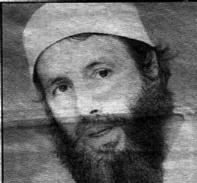| Worlds Apart

- Daily Mail 24 March 1998
- By Jane Kelly
After almost 20 years out
of view, hidden within the Moslem community of North London, Yusuf Islam, formerly the pop
singer Cat Stevens, is willing to talk. If you had interviewed him at the height of his
fame, between 1967 and 1977, you might have met him overlooking the bay in Rio, where he
lived as a tax exile. Now he holds court in a building that looks a cross between a
council flat and an old people’s home.
Once a lodging house for
single policemen it is now an ‘Islamic hotel’, set up to fund two Islamic
schools he founded in Kilburn.
In the lobby there was a
noticeable lack of piped music. "There are different opinions about music," the
veiled girl behind the desk said. "I listen to it, but many think it is
corrupting."
Yusuf, now 50 and once one
of the most popular pop stars in the world, gave up his singing career in favour of Islam
in 1977. But this week he broke his silence with a new album, I Have No Cannons That Roar.
Even this he would not have agreed to do if it was not for his desire to support the
Bosnian Moslems.
He also recently gave a
concert in Sarajevo, to an audience mostly too young to remember his heyday. Then he had a
string of memorable hits from Matthew And Son when he was 19 to his triumphant Moonshadow
and Tea For The Tillerman, which resounded through university bedrooms throughout the
Seventies.
It cannot have been easy
for him to step out there on stage again. He is a frail, nervous man, which cannot be
disguised by his bushy, badly dyed beard, and rather sinister khaki clothes.
"I was very nervous
before I went on stage in Sarajevo," he says. "In the past, as Cat
Stevens, I always had a huge backing group supporting me— drowning me out really.
This time I was alone. It all went well, except they applauded, which is non-Islamic. But
I don’t feel like doing it again."
The last time he
volunteered to perform was at the Live Aid concert in 1985.
"I was supposed to go
out and sing a solo," he says. "I was petrified, but Elton John went on too
long, so I missed my turn. I took that to be God’s will."
His life has achieved a
remarkable degree of security and order since 1977, when he decided to put music behind
him and ‘God’s will’ first. Since then he has obliterated his original self
and replaced it with a disciplined, austere man.
"People are fascinated
by the differences between my two lifestyles," he says. "But it was really just
a natural evolution."
Hardly. It appeared to be a
sudden dramatic event. He abandoned a world tour and declared himself a Moslem, astounding
the whole rock business. At the time it seemed inexplicable that he should abandon fame
for a religion perceived by many to be harsh, rigid and cruel.
He explained to me in his
quiet cockney voice that fame had been a kind of nightmare. When he talks now, the famous
luminous brown eyes that shone out from record sleeves and posters are cast down, out of
shyness and modesty.
"After the initial
success, I found myself a fantasy figure," he says. "My image fulfilled other
people. It did not fulfil me, but I bad to keep on with it because so many people
depended on me. My whole
life became exaggerated, and based on people’s idolisation. Unless you have
experienced it, you can’t understand how terrifying that is.
I needed to talk about my
fears and weaknesses but, despite the fact that I was surrounded by people all the time,
there was no one for me to talk to. No one would listen.
I wrote all my intimate
thoughts in my songs — that was my only outlet — but it didn’t help. I did
try to retire, but people would never leave me alone. I was always being thrust back into
focus. Islam was finding normality again. The community were welcoming and caring. They
saw me as a real person."
When he first declared for
Islam, many people believed he’d become insane. At the time, he said he feared that
he was going mad.
"I always had a fear
of madness," he says. "When I was famous I increasingly found that people
didn’t understand my concerns. I thought that either they were mad, or I was. I
became confused and anxious. I need order not chaos. I want to understand the causes of
things and I want to protect myself from the unknown. All that came together with
Islam."
As a rock star, he had been
known for many passionate affairs. He immortalised his love for actress Patti
D’Arbanville with his song Lady D’Arbanville. She later dumped him for Miami
Vice star Don Johnson and had her bottom tattooed. There was also a woman from Boston
named Lucy Johnson, who called herself Princess Cheyenne when she worked as a stripper.
She claimed to be having an affair with Yusuf in the late Seventies, after he became a
Moslem. When I ask him about this, he gives a shocked cry, raises his hands to his face
and blushes.
"How can you ask such
a question?" he says, sounding like a maiden aunt.
"Converting was
difficult in some ways. It took time. It was a slow process."
That was all he would say
about the transmutation of his rock star habits into those of a mullah who even believes
that small boys and girls should not swim together. As a good Moslem, he had to give up
loose women and get married. In 1979 he chose Fawzia Ali, a Central Asian woman whom he
saw at a mosque and was introduced to in a ‘chaperoned encounter’. He married
her for practical reasons.
"I liked her family
and her cooking," he says. "You have to look at a woman and say: 'Will she be a
suitable mother for my children? Will she make a comfortable home for me?'"
They now have five children
aged between 17 and ten — four girls and a boy. One son died when he was two weeks
old.
"It was God’s
choice that he died," he says softly. "Children go straight to Paradise. I read
about a Jew whose son died in an accident, and he couldn’t accept it."
His digressions are
fascinating to the modern ear, like overhearing the conversation of people from
another age. Rather than strutting the world’s stage, he is happy within the walls of
his modest London home, where his word is law. But you can believe it when he says he is
not a strict father. There is something naive and childlike about him.
"Home is a place of
joy," he says. "I have built my children a lovely garden. We have two goats and
some chickens. I would like a cat, but my wife doesn’t understand about animals
coming into the house."
His daughters are fully
veiled.
"They don’t
question it," he says. "They understand the wisdom of modesty. Whether they go
out to work one day will be up to their husbands. They will have to marry, but when they
do so will be up to them."
One thing they won’t
be able to do is leave the faith — "no possibility," he says — or
question its tenets, no matter how badly they fit in with modem thought. If his children
ask him about Darwin’s Theory of Evolution, for instance, he will refer them to the
scriptural version.
Born Steven Dimitri
Georgiou, he was the son of Greek Cypriot parents who ran a restaurant. They sent him to a
Roman Catholic school but he says Christianity did not attract him because it is so often
‘contradicted by science’. His ideas on history are unorthodox. He writes poetry
and, after thinking hard to name a European poet that he likes, says he admires
Shakespeare: "He has influenced everything, even the Bible."
There will probably be no
more records or concerts. He says his role in Britain is now ‘political’. He
sees himself as a broker for Islam, explaining it to the mystified British.
He has no long-term worries
about his view of the world finally being accepted.
"Within the next
hundred years, the British public will have accepted Islam," he says.
But will they ever really
accept Yusuf Islam in preference to Cat Stevens?
"If I keep on speaking
out, Yusuf will eventually eclipse Cat," he says. "Where there are moral issues
or causes that I believe in at stake, you will find it very difficult to keep me
quiet."
Article contributed by Linda
Crafar |